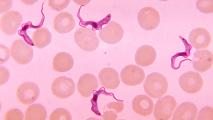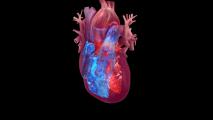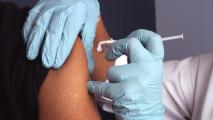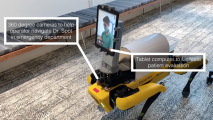
Biotech
Human history has been all but defined by death and disease, plague and pandemic. Advancements in 20th century medicine changed all of that. Now advancements in 21st century medicine promise to go even further. Could we bring about an end to disease? Reverse aging? Give hearing to the deaf and sight to the blind? The answer may be yes. And soon.
More
New CRISPR tech makes it possible to wipe out invasive mice
Australian researchers have developed a gene drive that renders female mice infertile, opening the door to a new type of pest control.
Breakthrough drug cures sleeping sickness with one dose
A new, one-dose treatment for lethal sleeping sickness was 95% effective at clearing the parasite from patients.
“DALL-E 2 of biology” designs proteins for new drugs
The Chroma AI’s ability to design proteins with structures no one has ever seen before could revolutionize medicine.
These tiny bubbles are “warheads” for killing cancer
By combining tiny nanobubbles with ultrasound, Israeli researchers showed they can destroy tumors.
Old Parkinson’s drug helps teens with type 1 diabetes
The Parkinson’s disease drug bromocriptine lowered blood pressure and reduced aortic stiffness in young people with type 1 diabetes.
Parents: Don’t focus on happiness, help build resilience instead
Happiness emerges from resilience, which helps children regulate difficult emotions and stressful situations.
Scientists uncover key to future hepatitis C vaccine
While treatments are available for HCV-related infections, they are expensive, hard to access, and do not protect against reinfection.
Startup unveils $179 houseplant engineered to purify your air
Neoplants’ $179 genetically engineered houseplant pulls VOCs from the air 30 times more efficiently than plants found in nature.
Bacteria breakthrough could create brand new cheese flavors
A new set of experiments has shown for the first time how the unique flavors of different cheeses can be linked to specific types of bacteria.
How neuroscience can make us better parents
Kids’ brains develop in four main stages. Each has its own particular set of advancements and challenges for parents.
FDA approves US’s first fecal transplant therapy
The FDA has approved Rebyota, a slurry used during fecal transplant therapy to treat recurrent C. difficile infections.
Magnets pull these tiny medical robots deep into the brain
LA-based startup Bionaut Labs is developing micro-sized medical robots that are guided through the body by magnets.
How flu got milder since 1918 pandemic
The risk of death from influenza has declined over time, but globally, hundreds of thousands of people still die from the disease each year.
Newly discovered gut bacteria may be a culprit behind rheumatoid arthritis
This bacteria is found only in the intestines of people with rheumatoid arthritis, and not in the intestines of healthy people.
Watch a Neuralink robot insert electrodes into a dummy brain
During a livestreamed event, a Neuralink robot precisely inserted 64 electrode-packed threads into a dummy brain in just 15 minutes.
How to fight Covid with light
Some wavelengths of light in a range called far-UVC kill microbes in experiments and appear to be harmless to people.
The (robotic) doctor will see you now
Study finds patients are receptive to interacting with robots designed to evaluate symptoms in a contact-free way.
Exercise boosts the brain — and mental health
New research is revealing how physical activity can reduce and even ward off depression, anxiety and other psychological ailments.
New brain cancer vaccine completes clinical trial
Northwest Biotherapeutics reports that its new brain cancer vaccine can extend glioblastoma patients’ lives by months or even years.
The science of habits
Whether you’re trying to break a bad habit or start a good one, psychologists have some tips to get you started.
Get inspired with the most innovative stories shaping the world around us.

































